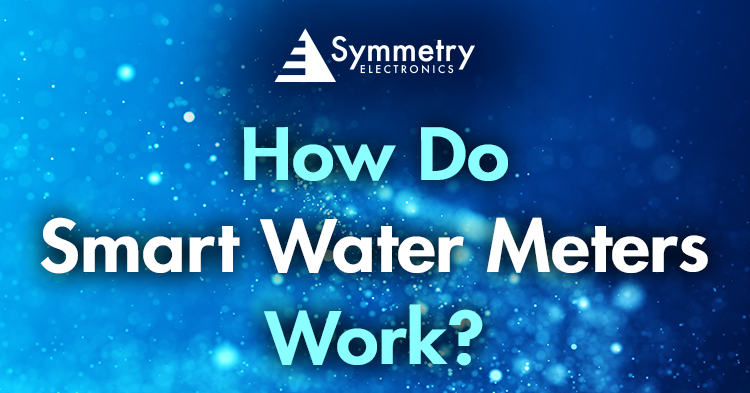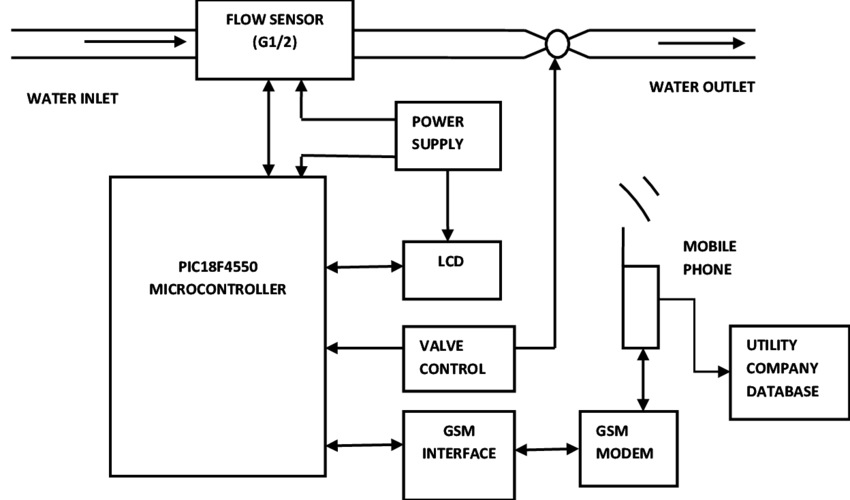- Home
- Symmetry Blog
- How Do Smart Water Meters Work?
How Do Smart Water Meters Work?
About Jari Haiston

Smart technology continues to generate efficiency in the way we use and interact with finite resources. The benefit of smart technology in relation to natural resources lies in its ability to enable better monitoring, conservation, and management of resources like water, energy, and waste, leading to more sustainable utilization. Water is a precious resource that needs to be managed effectively in the face of increasing population and environmental challenges. The World Counts reports that unless water use is drastically reduced, severe water shortage will affect the entire planet by 2040.
Enter the smart water meter—a revolutionary technology that offers advanced monitoring and management capabilities. Let’s delve into the anatomy of a smart water meter and explore how it can transform water management practices.
The Anatomy of a Smart Water Meter

A smart water meter is comprised of several core components that enable its functionality. At the heart of it is a highly accurate IoT sensor, typically based on ultrasonic or electromagnetic principles, that measures water flow. The water flow sensor monitors the amount of water passing through the meter with precision, ensuring accurate data collection.
Accompanying the flow sensor is a microcontroller unit (MCU) that processes data and communicates with the central monitoring system. The MCU can analyze water consumption patterns, detect leaks, and provide real-time data for better decision-making. To facilitate communication, smart water meters are equipped with wireless communication modules such as cellular, Wi-Fi, or LoRa. These modules enable seamless data transmission, allow remote monitoring of water consumption, and identify anomalies promptly.
Advanced Monitoring and Analytics in Smart Water Meters
Unlike traditional water meters, smart water meters go beyond basic measurement. They provide valuable insights into water consumption patterns. Users are better-informed to make decisions about water usage. The integration of advanced data analytics enables information collected by the meter to be turned into enhanced insights into usage patterns and detailed consumption reports. In turn, the ability to monitor water usage in real-time empower users to track their consumption, set usage goals, and adjust for optimal efficiency. By detecting leaks early on, smart water meters also help prevent water waste and reduce the risk of property damage.
How to Make Existing Water Infrastructure Intelligent
Additionally, smart water meters offer convenient implementation in existing water infrastructure. Smart water meters can be retrofitted to replace traditional meters or incorporated into new installations. Their seamless integration is suitable for both residential and commercial applications.
10 Smart Water Meter Use Cases
- Residential Water Management: Smart water meters installed in residential properties allow homeowners to monitor their water usage, detect leaks, and take proactive measures to conserve water and reduce utility bills.
- Commercial and Industrial Water Management: Smart water meters are deployed in commercial and industrial facilities to monitor and manage large-scale water consumption, identify inefficiencies, and optimize water usage for cost savings and sustainability.
- Utility Management: Utility companies utilize smart water meters to remotely monitor water consumption, streamline meter reading processes, and improve overall operational efficiency.
- Leak Detection and Prevention: Smart water meters continuously monitor water flow and pressure, enabling early detection of leaks and minimizing water loss. Real-time alerts and notifications allow for prompt action to mitigate damage and reduce water waste.
- Water Conservation Programs: Smart water meters play a crucial role in water conservation programs by providing users with detailed consumption data, usage analytics, and personalized recommendations for water-saving practices.
- Municipal Water Management: Smart water meters deployed in municipal water systems enable monitoring and control of water supply, distribution, and infrastructure maintenance, leading to more efficient management of water resources.
- Irrigation Management: Smart water meters integrated with irrigation systems allow for precise monitoring and control of water usage in landscaping, agriculture, and public green spaces, optimizing irrigation schedules and minimizing water waste.
- Real Estate and Property Management: Smart water meters in rental properties and multi-unit buildings help property managers track individual water usage, allocate costs accurately, and identify opportunities for conservation and cost reduction.
- Water Quality Monitoring: Some advanced smart water meters are equipped with sensors to monitor water quality parameters, providing early detection of contaminants or changes in water quality, and ensuring safe drinking water for consumers.
- Data-driven Decision Making: The data collected by smart water meters enables data-driven decision making for water resource management, infrastructure planning, and policy formulation to ensure long-term sustainability and resilience in water systems.
Smart Water Meter Solutions
Embracing smart water meter solutions can pave the way for efficient water management on a global scale. A digitally transformed water cycle is not only easy to use and implement, but it’s also paramount in overcoming water scarcity. Smart water meters have revolutionized the way we manage and conserve water resources with advanced monitoring capabilities, real-time data analysis, and user-friendly interfaces. Integrating smart water meters in existing water infrastructure enables individuals and utility companies to make more informed decisions, reduce water wastage, and contribute to a sustainable future.
If you’re interested in developing your own smart water meter, we have a broad portfolio of solutions suited for your design. Our knowledgeable team of Applications Engineers are available to help guide you in finding the ideal components to suit your application’s requirements. Consultation is free and available throughout your design cycle. Contact Symmetry Electronics today!
